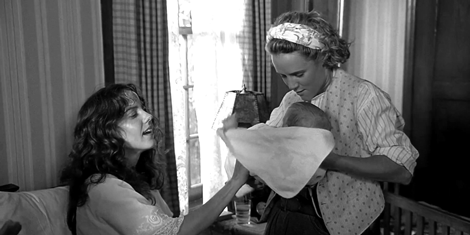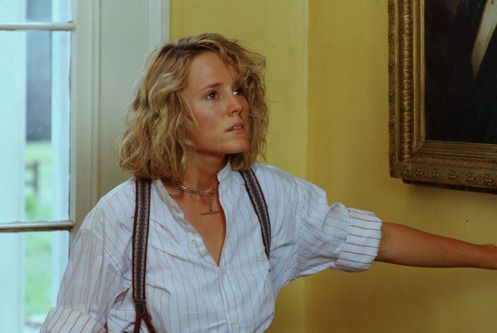
A Bond Born in Unlikely Soil
Set in the rural South during a period when gender roles were rigid and social expectations unyielding, Fried Green Tomatoes introduces us to Ruth Jamison and Idgie Threadgoode — two women whose friendship challenges every assumption of their time. Their connection grows not out of shared societal roles, but out of difference: Ruth, a conventionally proper woman bound by duty and religion, and Idgie, a wild, untamed spirit who refuses the norms expected of her.
When Ruth arrives in Whistle Stop, she is engaged to a violent man and clinging to the limited options given to her by her upbringing. Idgie, though outwardly carefree, is quietly grappling with grief after the death of her beloved brother, Buddy. Their first real connection occurs not through flirtation or drama, but through mutual understanding and quiet care. It is a friendship — perhaps even a love — that emerges against the grain of what Southern society permitted.
Defying Expectations with Every Step
Their bond becomes a subtle yet profound act of rebellion. Together, they purchase and operate the Whistle Stop Café — a decision that flies in the face of societal expectations for women at the time. Business ownership, especially in a male-dominated industry like food service, was rare for women, let alone two unmarried ones. This act alone places them on the margins of respectability, and yet it is within these margins that they thrive.
Their café is more than a business; it is a shared home, a symbol of their independence, and a statement of self-sufficiency. While townsfolk visit the café for meals, few likely understand the radical nature of its existence. Every day that Idgie and Ruth open the café’s doors, they are refusing the roles of subservient wife or dependent daughter. They live together, raise a child together, and manage their own finances — a revolutionary lifestyle cloaked in the language of Southern hospitality.
More Than Friendship, Less Than Defined
The ambiguity of Ruth and Idgie’s relationship has long been the subject of discussion. In the film, their connection is portrayed with tenderness and loyalty but avoids explicitly labeling their bond as romantic. This choice, while controversial, allows the audience to interpret their relationship in a way that transcends labels. Whether romantic or not, their bond is unmistakably intimate, and it challenges the heteronormative assumptions of both the time period depicted and the one in which the film was released.
Their love — however one defines it — is not defined by physicality but by mutual trust, emotional support, and shared purpose. It is a love that builds, protects, and liberates. In many ways, it mirrors the types of bonds that have sustained women across history: relationships that offer refuge, partnership, and emotional kinship, often outside the view or understanding of the male gaze.
A Feminist Blueprint Hidden in Plain Sight

What makes Ruth and Idgie’s relationship especially powerful is that it functions as a feminist blueprint without ever declaring itself one. Through their choices and their quiet resistance to societal norms, they embody the values of autonomy, equality, and solidarity. Ruth escapes a violent marriage — an act of courage that women in her time and even in ours often find perilous. Idgie remains unapologetically herself, choosing not to marry, dress conventionally, or tone down her opinions.
Their café becomes a haven for misfits, outsiders, and those who don’t quite fit into the mold. Black workers like Big George are treated as family. Those who have nowhere else to go — like Smokey Lonesome — are fed and cared for. In this way, the Whistle Stop Café operates as more than a business: it is a microcosm of inclusive, woman-led community, built on radical acts of care.
Legacy Beyond the Frame
While the movie does not follow Ruth and Idgie beyond a certain point, their legacy echoes throughout the film’s other narrative — that of Evelyn Couch and Ninny Threadgoode in the present day. It’s no accident that Evelyn’s transformation is sparked by stories of these two women. In Ruth and Idgie, she sees not just a better way to live, but proof that such a life is possible. She witnesses women who chose each other over conformity, who found joy in defiance, and who built a world of their own.
This transgenerational connection is one of Fried Green Tomatoes’ most powerful themes: that the strength women find in one another can endure beyond death, beyond memory, and beyond social limitations. Ruth and Idgie become not just characters, but archetypes — representing what can happen when women reject silence, support one another, and choose freedom in whatever form it takes.
Conclusion — Love Without Permission
In a society that seeks to define and limit women’s relationships, Ruth and Idgie stand as a testament to love that asks for no permission. Their friendship, partnership, and possibly romance transcend binaries and social rules, offering instead a vision of chosen family and self-actualization.
By living truthfully and together, they teach us that some of the most radical revolutions begin not in politics or protest, but in kitchens, on porches, and in the everyday courage of saying: “I will choose this life, and I will not apologize for it.”
